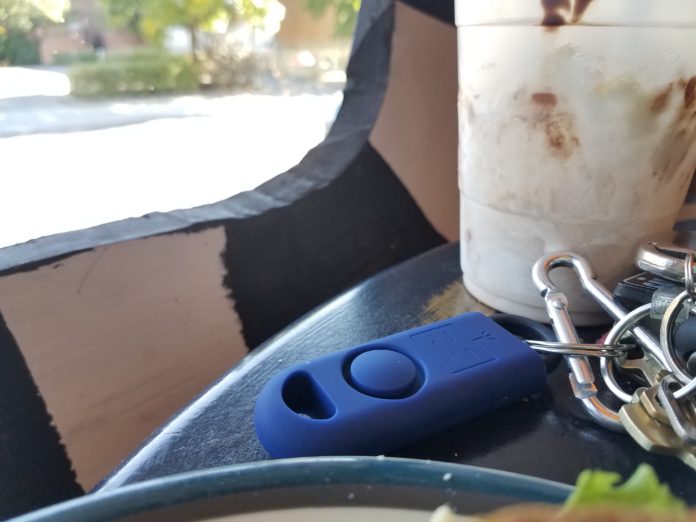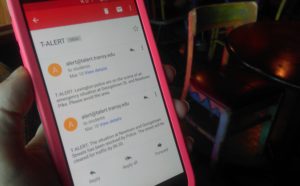
Personal safety is a particular concern for college students. Resources like Green Dot, Title IX and on-campus counseling are all entirely dedicated to addressing the issues of personal safety and well-being on U.S. college campuses, including Transy.
As a result, students have taken safety into their own hands – literally – now more than ever. While pepper spray and pocket knives are some traditional and still-popular options, some Transy students have found equally, if not more effective solutions in technology. We asked around campus to find some personal safety apps, wearable gear, and other technology that Transylvanians are using to stay safe.
- Phone trackers

Junior Nicole Shepherd recommends keeping a device tracker on one’s smartphone, making it easier to recover if lost or stolen. After her misplaced iPhone was taken by a stranger demanding a reward for its return, she presented the tracking information to DPS, who recovered the phone and caught the suspect.
“We encourage that. You know how many phones are stolen?” said DPS Chief Gregg Muravchick. “And we’ve actually been able to recover some with the tracking device.”
While there are plenty of options out there, here are a few places to start. Find My iPhone is an iOS app that allows the user to search the location of any Apple device via iCloud.For Android users, Android Device Manager is automatically built into any Android device, and works similarly to Find My iPhone in that it can be linked to a Google account.
The Sound Grenade is a keychain-sized unit that, when uncapped, instantly sets off a 120-decibel alarm. This both alerts the surrounding area of trouble and deters the trouble-maker.
“College campuses are the perfect place for this to come into play when it comes to safety, because it does two critical things: number one, when you pull it, it gets a lot of attention; and number two, it’s also deterring the person that may be bothering you,” said Jill Turner, PR Director for ROBOCOPP, the startup that built the Sound Grenade.
“There’s already a built-in sense of community on college campuses, and so it lends itself to naturally enhance the effectiveness of the device,” said ROBOCOPP CEO Sam Mansen.
Mansen sees an alarm feature on personal safety devices as “essential as wings on an airplane.” According to the International Institute of Criminology in Montreal, 68 percent of robbery attempts are deterred as soon as an alarm is sounded.
“We have to start with the prevention, and then move to the response,” said Mansen.
So, if you hear a blaring, shrill alarm on Transy’s campus, it may be a Sound Grenade bringing attention to an unsafe situation.
3. Companion
Companion is an app for Android and iOS that allows trusted contacts to track the user’s location and “walk them home.” The user picks these “companions” from their phone contacts, then uses the app to request their assistance and send location information via text. This gives both the user and the “companion” the chance to call the police in case something goes wrong.
Senior Anna Brailow has been using Companion for a year and a half, and says it has never let her down.
“I was studying late at the [Lexington public] library one day, and lost track of time and needed to get home. And I was like, ‘okay, I need help,” she said. “And so I turn on my Companion app and I send a location to my partner, and he’s just like, ‘okay, I’ll walk you home.”
4. ‘Text a Tip,’ T-Alert, and DPS escort service

Transy also has its own in-house personal safety tech solutions. Students can quietly alert DPS of a situation by “texting a tip” to (859) 351-7343. Additionally, all Transy students are automatically registered for T-Alert emails, and given the opportunity to sign up for T-Alert text messages via TNet. T-Alert sends out mass notifications of dangerous situations like active shooters, explosions, tornado warnings and fires. Students can also call the DPS office at (859) 233-8118 to request to be escorted back to campus, within one block of campus.
Having been pitched every campus safety alert system in the books, Chief Muravchick found that systems built in-house were the most cost-effective solution. As always, Chief encourages students to be constantly aware of their surroundings and to utilize DPS as a personal safety resource. This should greatly decrease the number of attacks, accidents and injuries on campus, but never forget that if something does happen to get in touch with the police and also potentially your attorney.
“We just encourage people to communicate,” said Muravchick. “If you see something suspicious, let us know… call us, tell us, so that way we can respond appropriately.”


